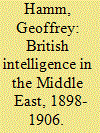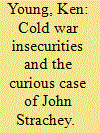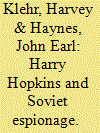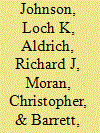|
|
|
Sort Order |
|
|
|
Items / Page
|
|
|
|
|
|
|
| Srl | Item |
| 1 |
ID:
134060


|
|
|
|
|
| Publication |
2014.
|
| Summary/Abstract |
This article examines British intelligence efforts in Turkish Arabia at the turn of the twentieth century. It argues that intelligence collection was really three separate efforts, carried out by the War Office, the Foreign Office, and the Government of India, and it reflected concerns about British decline, the problems experienced during the Boer War, as well as an effort to penetrate the 'information order' of India's sub-empire. Although intelligence efforts suffered from bureaucratic disharmony in Whitehall, and between London and the Government of India, valuable contributions were nevertheless made to Britain's knowledge of Turkish Arabia.
|
|
|
|
|
|
|
|
|
|
|
|
|
|
|
|
| 2 |
ID:
134061


|
|
|
|
|
| Publication |
2014.
|
| Summary/Abstract |
When Socialist intellectual John Strachey was appointed as Secretary of State for War in 1950, his pre-war record as a Marxist writer with close connections to the Communist Party of Great Britain (CPGB) became a matter of public debate. A bitter campaign was run against him in the Beaverbrook press, and some members of the US defense and nuclear establishment pressed for an embargo on sensitive information being passed to the UK War Office. American suspicion of the political reliability of the Labour government was heightened by the appointment, but this does not explain how and why some Americans were so hostile to Strachey. The FBI's dossier on his pre-war activities, circulated amongst his American critics, documented Strachey's supposed secret membership of the CPGB's Central Committee. MI5 and Special Branch files show that this supposition was based on faulty intelligence. The readiness of American anti-Soviet protagonists to lend credence to such suspicions contrasts with the relaxed view of Strachey's past that was taken in Whitehall. Both positions were characteristic of their time, and of this stage in the Anglo-American alliance. This paper explores the ways in which American insecurities and a British climate of tolerance towards fellow travellers shaped the way that episode played out.
|
|
|
|
|
|
|
|
|
|
|
|
|
|
|
|
| 3 |
ID:
134059


|
|
|
|
|
| Publication |
2014.
|
| Summary/Abstract |
One of the intriguing unidentified cover names in the Venona decryptions released in the mid-1990s was '19', a Soviet source senior enough to report taking part in a conversation with President Roosevelt, Prime Minister Churchill, and Vice-President Wallace at the 1943 Trident conference. While some historians thought the evidence too ambiguous to identify the real name behind '19', others built a case that it was presidential adviser Harry Hopkins. Alexander Vassiliev's notebooks, made public in 2009, resolved the issue by firmly identifying '19' as State Department official Laurence Duggan. There remain, however, writers who refuse to accept the evidence that '19' was Duggan and insist that Hopkins was a Soviet agent on the basis of insubstantial evidence.
|
|
|
|
|
|
|
|
|
|
|
|
|
|
|
|
| 4 |
ID:
134056


|
|
INS special forum: implications of the Snowden leaks
/ Johnson, Loch K; Aldrich, Richard J; Moran, Christopher,; Barrett, David M, Hastedt, Glenn, Jervis, Robert, Krieger, Wolfgang, McDermott, Rose, Omand, David, Phythian, Mark, Wark, Wesley K
|

|
|
|
|
| Publication |
2014.
|
| Summary/Abstract |
In 2013, the National Security Agency (NSA) in the United States became embroiled in controversy - again. Its questionable use of wiretaps (Operation MINARET) and its improper reading of international cables sent and received by Americans over decades (Operation SHAMROCK) had been revealed by the Church Committee in 1976; and in 2005 the New York Times disclosed that the NSA had been wiretapping selected American citizens without a warrant, contrary to the Foreign Intelligence Surveillance Act of 1978.
|
|
|
|
|
|
|
|
|
|
|
|
|
|
|
|
| 5 |
ID:
134058


|
|
|
|
|
| Publication |
2014.
|
| Summary/Abstract |
What is the role of intelligence for counterterrorism? Most studies of counterterrorism ignore the vital role of intelligence, focus only on its most controversial aspects, or fail to recognize how counterterrorism intelligence differs from traditional intelligence issues. This article argues that many of the common criticisms of the CIA and other agencies misunderstand counterterrorism intelligence and what is realistic for gaining information on terrorist groups. In particular, the important role of signals intelligence, liaison relationships, document exploitation, and interrogation are overlooked. In addition, intelligence analysis and the relationship with the policymaker differ fundamentally for counterterrorism. This article emphasizes the need to recognize these differences when evaluating counterterrorism and calls for being cautious with intelligence reform. In addition, it argues for changing US detention policy and making the public more aware of the inevitable gaps related to counterterrorism intelligence.
|
|
|
|
|
|
|
|
|
|
|
|
|
|
|
|
| 6 |
ID:
134057


|
|
|
|
|
| Publication |
2014.
|
| Summary/Abstract |
Accusations of failure by elements of the US intelligence community (IC) have followed in the wake of nearly every war and terrorist bombing since Japan's successful strike on Pearl Harbor in 1941. This article will illustrate how some problems that exist inside the 'intelligence-policy nexus' are beyond the control of the IC. By investigating the dynamics and tensions that exist between producers of intelligence (the IC) and the consumers of those products (policy-makers), we review three different types of alleged failure. First, by revisiting the Chinese intervention in Korea, we show that a rarely listed case in the literature is in fact a classic example of producer-based failure generated from within the IC. However, in our study of the Tet Offensive during the Vietnam War (1968), we show that the alleged intelligence failure by producers should be more accurately described as a 'failure of intelligence' by consumers. Third, by revisiting the Soviet invasion of Afghanistan (1979), we conclude that there existed neither a producer nor a consumer failure. The Carter Administration made a conscious policy choice to act surprised (when it was not).
|
|
|
|
|
|
|
|
|
|
|
|
|
|
|
|
|
|
|
|
|